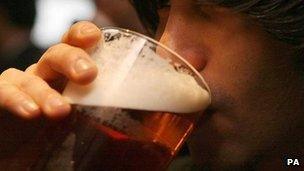UK manufacturing output sees sharp fall
- Published

The ONS said weaker demand for beer hit food and drink output
UK manufacturing output registered a surprisingly sharp fall in October, resurrecting fears of recession.
Output fell by 1.3% from September, the Office for National Statistics said, external, with food and drink output, notably beer, down following the Olympics.
It was the worst fall since June, when activity was depressed by extra public holidays for the Diamond Jubilee.
Meanwhile, estimates for growth from a leading think tank confirmed the weak economic picture.
The National Institute for Economic and Social Research's (NIESR) monthly estimate, external of gross domestic product (GDP) suggested that output grew by 0.1% in the three months to the end of November, the same as in its previous estimate for the three months to October.
Although it said it did not expect this "anaemic" rate of growth to continue, it expects GDP growth of just 1.1% next year, not enough to begin to close the UK's negative output gap and bring down the rate of unemployment in 2013.
It also adds to evidence that the UK economy may be relapsing into recession after a short rebound over the summer.
The ONS's most recent growth estimate suggested the economy expanded by 1% in the third quarter of the year, following nine months of mild contraction - in part thanks to the boost from tourist spending during the London Olympics.
Guns, beer, coke and drugs
Compared with a year ago, manufacturing output in October was down by 2.1%.
Production of alcoholic beverages was down 10% from September, and 16% from a year earlier.
There were also sharp falls in activity in the coke and refined petroleum, weapons and ammunitions, and pharmaceuticals sectors.
The figure for the wider measure of industrial output, which also includes energy production and mining, was down 0.8% in October, after falling 2.1% in September.
The seasonally adjusted index of production fell by 3% in October 2012 compared with a year ago, the 19th consecutive monthly fall on the same month a year ago.
The figures were worse than economists had expected.
"Very disappointing - triple dip [recession] here we come," said Alan Clarke at Scotiabank.
"Manufacturing was diabolical. Sadly, I think there is not a lot to suggest that it is temporary. Survey data has been fairly downbeat."
Potential
The chief economist at the British Chambers of Commerce, David Kern, said the industrial production figures were "bleak", and added it was clear that "the manufacturing sector is facing major obstacles to a sustainable recovery".
However, he said there were reasons to be confident about the sector's prospects.
"Manufacturing is still a significant sector of our economy and is still benefitting from a competitive exchange rate, not withstanding sterling's rise over the past year... the sector is well-managed, and has the potential to recover."
Oil and gas extraction fell in the month at the fastest rate since records began in January 1998, although that was partly due to maintenance works, which included the temporary shutdown of the largest oil field in the North Sea.
The news comes in the same week as the government's Autumn Statement, which said the economy would shrink this year, rather than expand, as had first been predicted.